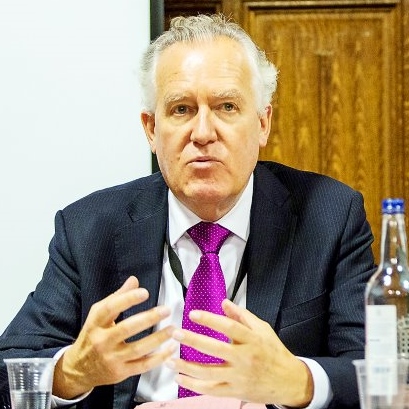
News

Islamic State’s destructive legacy in the Middle East
STEVEN GRUZD
Today, the deadly jihadist Islamic State in Iraq and the Levant (ISIL), perpetrating gruesome terror attacks worldwide is, Hain said, “industrialising martyrdom and militarising suicide”.
Hain delivered an eloquent lecture entitled “Islamic State and Terror: War Without End?” on Tuesday at the Wits Business School, where he is a visiting adjunct professor.
Kenyan-born and Pretoria-raised, Hain spearheaded the sports boycott against apartheid South Africa from exile in the UK, before serving as a Labour MP for 24 years and minister in the Blair and Brown governments.
Hain illustrated the “unspeakable brutality” of ISIL (aka ISIS, IS or Daesh, its Arabic acronym), that seeks to create a myth of omnipotence: execution of thousands of Syrians, Iraqis and foreigners; selling women and children into sex slavery; crucifying boys; and that harrowing video of a captured Jordanian airman burnt alive in a cage.
“Moments before their own executions, victims have been forced on camera to kiss the heads of the recently decapitated… Minority groups are reportedly hunted for sport… family members have reportedly been forced to eat the corpses of their loved ones.”
Hain explained that ISIL seeks a caliphate – a religious Islamic state – disregarding borders created by “imperialist crusaders”. ISIL has support from African terror groups like Nigeria’s Boko Haram and Somalia’s Al Shabaab.
He described ISIL’s sophisticated use of social media, sending brutal photos and videos to thousands of followers: “Whereas Al-Qaida is a secretive, cell-based and fragmented movement,” said Hain, “ISIL is highly centralised and highly vocal.
“ISIL adherents have successfully built up a brand which is strong, recognisable, clear and direct – ideal for recruiting, especially among disaffected young people.”
Hain sketched a grim, complex picture: “ISIL murders both other fundamentalist Sunni Muslims and all Shia Muslims; Saudi Arabia is combating Iran; Turkey belatedly fights ISIL while attacking the Kurds; the US and Russia, their bombs raining down on Syria, have been sucked into this maelstrom, sometimes in uneasy alliance against ISIL, sometimes supporting their own factions in direct opposition to each other.”
These conflicts are multi-layered. “After the Arab Spring uprisings, Sunni states vied… for influence by supporting rival Islamist groups, with the Muslim Brotherhood promoted by Qatar and Turkey, and Saudi Arabia and the UAE viewing it as a real threat.”
ISIL’s rapid advance from Syria into Iraq in 2014, was eventually stemmed after Western help was requested by Iraq and Kurdish authorities.
Relentless Russian bombing in support of Bashar al-Assad’s Syrian regime (with Iranian backing), has also reduced ISIL’s territory (once the size of Britain), as has the involvement of Jordan, Saudi Arabia, the United Arab Emirates, Bahrain, Qatar and, belatedly, Turkey. It’s crowded.
But he warned that ISIL “remains a callously potent threat, with the capacity to spring back or strike elsewhere… It is not simply ferociously ruthless, but militarily canny.”
Hain urged that the West must ensure “regional ownership of, and responsibility for, tackling the ISIL problem… otherwise the conflict becomes the very one ISIL craves: with the ‘infidels’ of the West.”
He adds: “Unless [they] are prepared to embrace Arab, Persian and Turkish ownership of the region’s conflicts and to put the onus on local nation states to find a solution, there is no prospect of establishing peace and stability in the Middle East.”
Hain argues that Western powers should have pushed for dialogue in Syria from 2011 – without demanding Assad’s removal from power.
“Diplomacy, engagement and mutual respect, should be the priority, not coercion, polarisation and bombast from Riyadh and Washington.”
Hain said that “since 9/11, the West has had a pretty poor success rate for its interventions in Muslim countries”, citing the “disaster” of the 2003 Iraqi invasion, the chaos in Libya after the 2011 Nato intervention, and called Syria “one of the worst Western foreign policy catastrophes in modern times”.
Iran’s “arc of influence” now stretches to Lebanon, not what the US expected. Hain said: “President Trump’s bumbling bellicosity in the region, could actually strengthen Iran’s position.”
When asked about impacts on Israel, Hain replied that if Israel continues to frustrate the formation of a Palestinian state, ISIL’s influence could grow among Palestinians.
“Israel will continue to be under siege. The two-state solution is rapidly fading… there needs to be direct negotiations without preconditions, such as dismantling settlements or Hamas recognising Israel.”
He reflected on his own ministerial experiences in Northern Ireland in 2007. “We had to sit down and negotiate with the IRA, without preconditions.”
He said that sometimes a conflict needs the parties to be so exhausted that they have to contemplate the unthinkable – talking with their enemies.




